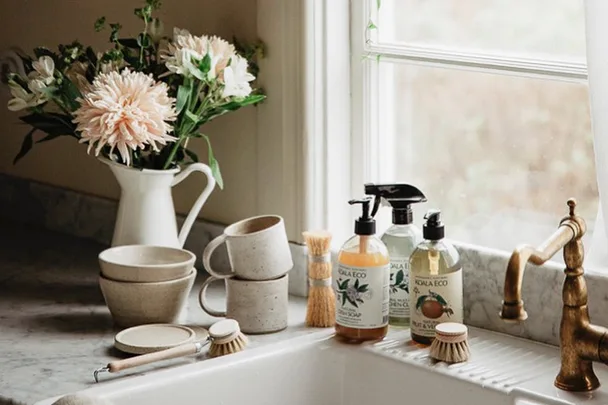Consumer consciousness around waste, choosing ethical products and living more sustainably is more prevalent than ever, but an area that’s often disregarded is, well, the area around us. By now, most of us have done the research and have relatively solid stances on the food we consume, the ingredients we’ll accept in our skincare, and make efforts to always choose the reusable options where possible.
Yet, that same care is often not extended to the cleaning products that are sprayed, swiped and wiped liberally around our homes. But it should be.
Who among us has not stood in the cleaning product aisle at the supermarket, staring down at the natural or eco-friendly surface cleaner, before ultimately opting for a conventional alternative? Whether it’s the price, unconscious bias about effectiveness, or simply an attachment to the way our families cleaned house, there’s often a barrier to entry when it comes to committing to eco-friendly cleaning products.
Why should we consider eco-friendly cleaning products?
“Research has shown that a lot of the ingredients in mainstream cleaning products are harmful to our skin, eyes, and nervous system,” Jessica Bragdon and Paul Davidson, explain to me via email. Bragdon and Davidson are the people behind Koala Eco, a natural and consciously made cleaning product line. “That’s in addition to being harmful to the planet,” they add.
“Conventional cleaning products contain chemicals toxic to humans and animals, and are slow to biodegrade (so toxic for the planet too). There’s a reason why the packaging of these products show warnings about poisons and flammability,” say Bragdon and Davidson.
One of the main benefits of a well-formulated eco-friendly cleaning product is what is left out of the bottle. “Eco-friendly cleaning products like the ones we make at Koala Eco are never tested on animals, and they’re also free from dyes, petrochemical solvents, ammonia, caustics, phosphates, bleach, sodium laurel sulphate, and non-sustainable Palm Oil-derived ingredients.”
“They are also marine and septic tank safe: no bleach or chlorine, minimal impact on the environment after drain disposal. Our products rapidly biodegrade into harmless by-products providing a ‘down drain benefit’. Essentially, bone-fide eco-cleaning products are people-, pet- and planet-safe.”
Beyond formulations, there’s also the problem of packaging.
While it pains me to admit this as someone who at any given time has a number of plastic berry punnets sitting under their desk awaiting the yellow-lidded bin, the fact of the matter is we cannot recycle our way out of the pandemic of plastic we’re living in.
Per a 2017 Science Advances paper, of the staggering 8.3bn tonnes of virgin plastic produced worldwide only 9% has ever been recycled. If that didn’t make your stomach drop, there’s also the fact that if the current rate of production and consumption continues, it’s estimated that by 2050 there will be 12 billion metric tons of plastic in landfills.
A reminder, it’s not only the plastic bottle itself that poses a problem. Consider the fact that the majority of the resources consumed in the packing, shipping and stocking of conventional cleaning products are expended on a product that is predominantly water. But what if the classic ENJO product-free cleaning cloth isn’t quite your ideal solution?
One unique eco-friendly cleaning solution comes from New Zealand company Ethique, who have created a range of waterless cleaning concentrate bars that eliminate many of the aforementioned drawbacks of conventional cleaning products. Their eco-friendly cleaning products are packaged in wholly compostable cardboard packaging (yes, even the security seal) and are simply mixed with water in your own home to create various household surface cleaners—the range even includes a dishwashing liquid concentrate.
Ethique’s CEO Brianne West pointed out that another important factor to be aware of when looking for a truly sustainable eco-friendly cleaning product isn’t just that the ingredients are natural and well packaged. “Only very recently have manufacturers started paying attention to the packaging and supply chains sustainability,” she explained via email.
“We have a finite number of resources on our planet that we are rapidly eating away at,” says West. The degradation of our environment is visible every day outside our window. We need to start making better choices to safeguard our planet’s future for future generations (and all its wild inhabitants).”
Are eco-cleaning products as effective as regular cleaning products?
Let us quash any doubts about eco-friendly or natural cleaning products efficacy right now. Eco-friendly cleaning products do not equate to lower effectiveness.
“Our products have been extensively and independently lab-tested and found to kill 99.99% of bacteria when used as directed,” say Bragdon and Davidson. “As an important part of Koala Eco’s production and development processes, we’ve had our cleaners tested on multiple surfaces including marble, concrete, and porous stone, to ensure they won’t damage any of these materials, and to make sure we are using a safe amount of essential oils. Every test has given us beautiful results. We do however always recommend a patch test when you use the cleaner for the first time on a new surface.”
West concurs that “Green chemistry has come a long way,” and adds that it’s likely only non-household, industrial situations that would require a heavy-duty conventional cleaner.
But aren’t eco-friendly cleaning products more expensive?
“This is something that often comes up, because initially, it can feel like a bit of a decision to invest in clean, eco-friendly products if you are not used to choosing them,” say Bragdon and Davidson. “It may seem you are paying more than you would for cheap, toxic products. But all I can say is once you try genuinely environmentally friendly products that use the power of native plants, it is hard to justify going back to the synthetic fragrance and harsh effect of conventional products.”
West also concedes that yes, sometimes more sustainable alternatives are more expensive. “With ethical choices comes cost. Our concentrates are more expensive due to our choices to ditch plastic (our packaging is 16x more expensive than a bottle!) to avoid all palm oil and to pay our team a living wage and use fairly traded ingredients. (And of course, all our other ethical choices!)”
Koala Eco also notes the concentrated nature of their formulas, “You can be sparing with them, and still get superior results. We also make large sizes, and offer refills. If you buy our products online in bulk, that also gives you more value for money.”
“If you choose products that state they have essential oils, but these oils are diluted with fragrance, it may make the product cheaper, but it will also be less effective, and you will end up spending more in the long run. It doesn’t cost you to be discerning. You really do get what you pay for.”
How do you avoid brands that are simply greenwashing their image?
“That’s a difficult one,” West says. “If they don’t display their ingredients that’s a red flag (it’s not legally required for cleaning products like it is cosmetics.) Packaging is something else to consider, is it genuinely sustainable or just ticking a box?”
The Koala Eco team suggests that “if this is something you are really invested in doing, then you have to take on a bit of research, and maybe read some relevant literature. Compare the market. Check labels carefully.”
Something they note in particular is a product trying to hide a multitude of sins behind a word: “fragrance.”
“If they have ‘added fragrance’ or words to that effect, avoid them. Many so-called ‘green’ cleaning products on the market are not actually green. They often combine a large percentage of toxins with a small percentage of essential oil, so they mislead customers in thinking their products are free from harmful synthetic fragrances. Remember, these synthetic fragrances are there to mask the unpleasant smell of ammonia and other compounds.”
“It’s the small local companies transforming the space and hopefully the larger companies will follow.”
Any tips for those switching to eco-friendly cleaning products?
“Just give it a whirl one product at a time, you’ll be surprised how good they are,” says West. “And if one doesn’t work for you, try another.”
The Koala Eco team also suggests starting small, or, if you’re so inclined, taking the DIY route.
“For example, olive or coconut oil and lemon on an old cloth for polishing wooden furniture is a great natural option. A few drops of essential oil in the toilet gives a fresh aroma—try orange or eucalyptus. Or you could add old citrus peels to vinegar, baking soda and water for a natural cleaner for benchtops that are safe for your family.”
“It might sound odd coming from us, suggesting you start by making your own, especially when we have a company that makes and retails natural products, but honestly, if it means one less household using harmful, toxic cleaners, then that’s a win for the planet, and we couldn’t be happier. And once people realise that the compromise (and ugly smell) lies in using harmful formulas rather than natural ones, then, as we’ve said, it’s difficult to go back to so-called conventional cleaners.”
Below, marie claire’s eco-friendly cleaning product range recommendations.
Zero Co
Delivered straight to your door, Zero Co’s keep-forever products are crafted from ocean, beach and landfill waste (OBL) and are designed to be refilled (from pouches made with recycled plastic) for continuous use.
Each bottle is chic and colour-coded, so you won’t mind when your significant other forgets to put them away, too.
Every pack also comes with a return mailer meaning you can post back your empty refill pouches (for free) to be cleaned, refilled and reused.
With a goal to “un-trash the planet” you can also trace your impact on Zero Co’s site as they track their efforts to remove plastic and rubbish from the ocean.
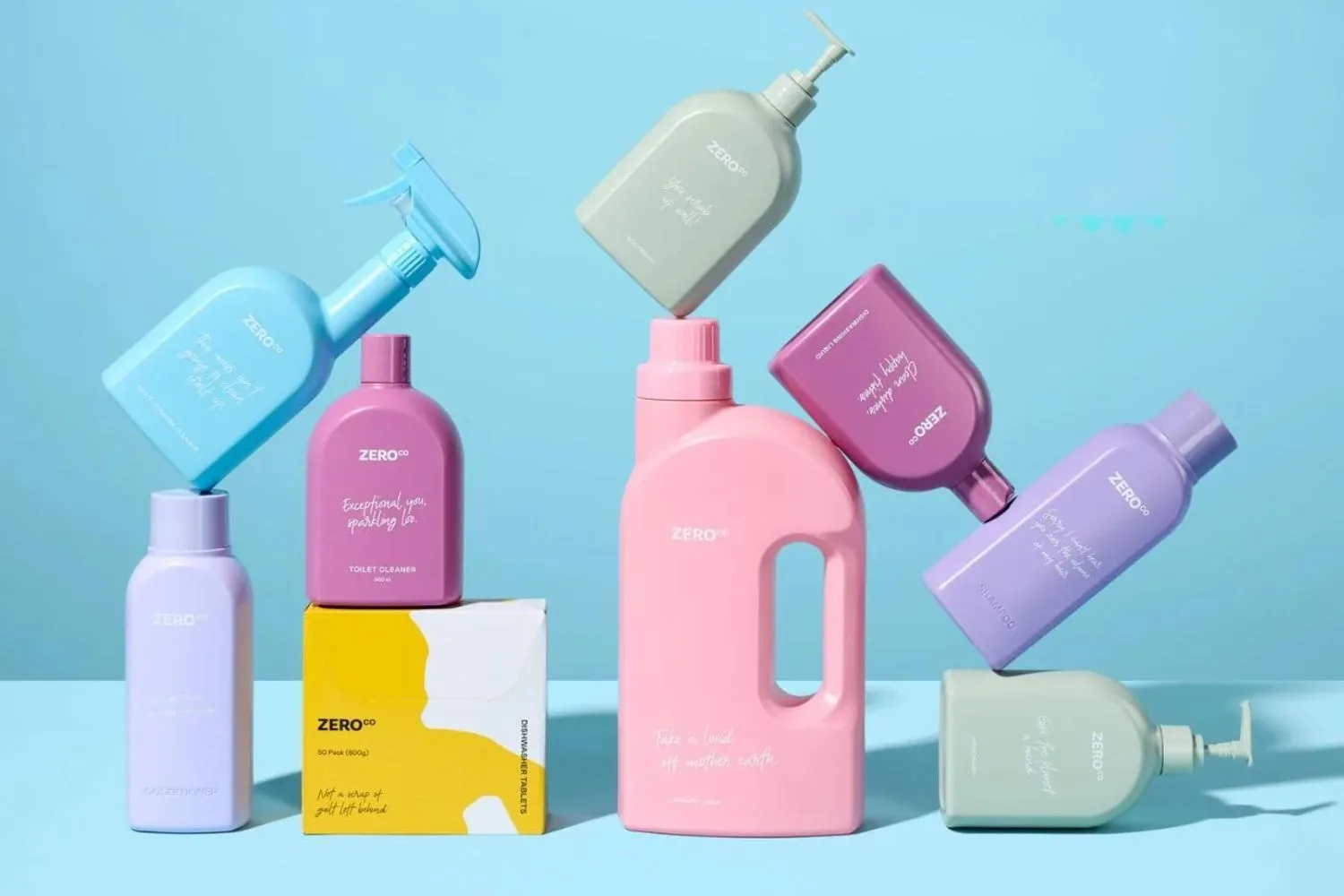
Everything Starter Pack, $199 at Zero Co
Koala
Koala Eco uses 100% pure Australian essential oils, combined with vinegar, sugar-based biodegradable alcohol and plant derived ingredients. Each ingredient included in the line’s eco-friendly cleaning product line up is researched, sourced and tested by the team.
While they’re not “zero waste”, the brand doesn’t create any new plastic with their bottles (recycled and recyclable) and also give a percentage of each sale to One Percent for the Planet.
We’re pleased to report these cleaners are as effective as they are aesthetically pleasing.
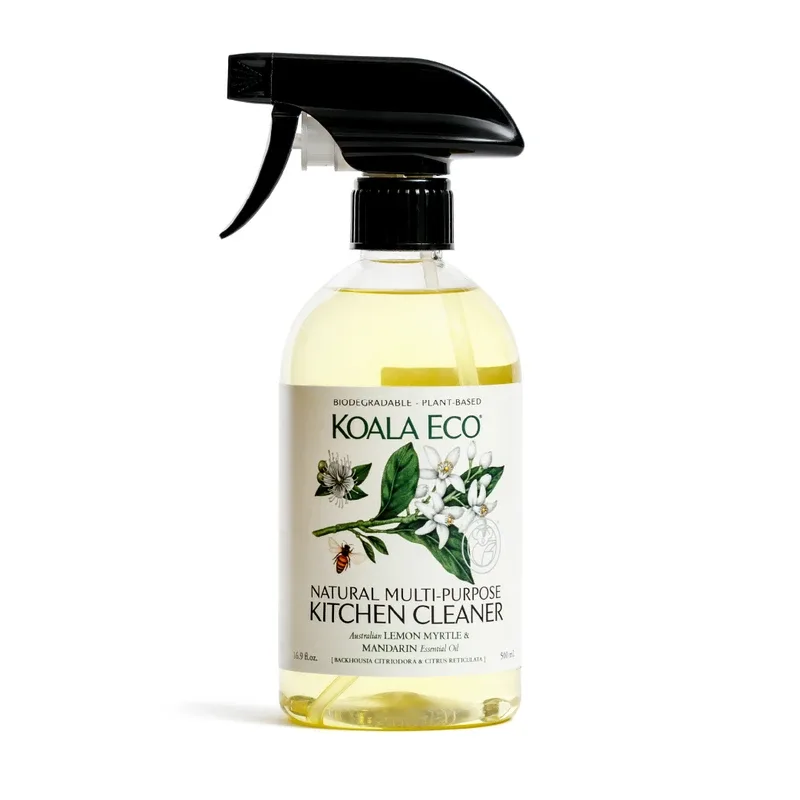
Natural Multi-Purpose Kitchen Cleaner 500ml, $12.95 from Koala Eco.
Ethique
While we’ve not yet tried everything in the range, Ethique’s line of concentrated cleaning products is a pleasing example of a more sustainable solution that doesn’t compromise on efficacy, packaging or ingredients.
With entirely home compostable packaging, the line is sustainable, biodegradable and safe for people and the planet. They’re also antibacterial, per independent testing.
Turning the concentrates into cleaners is also a very simple process. Using a pyrex or glass measuring jug, break up the solid concentrate and cover with the directed amount of boiling water. From there, stir until it’s dissolved and then house the solution in an old bottle from your previous products.
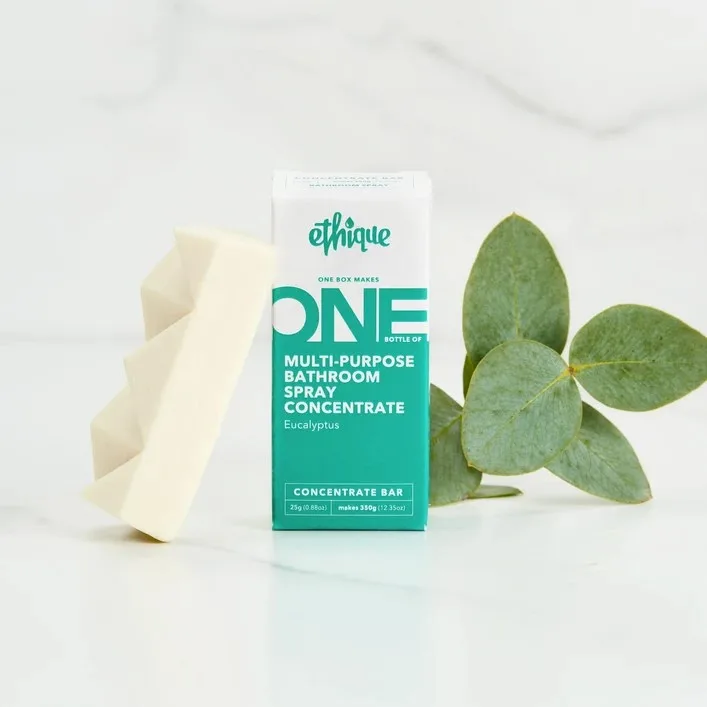
Multi-Purpose Bathroom Spray Concentrate (one box makes 350g of spray), $9.00 from Ethique.
Cove Cleaning
Another option for those looking to reduce their plastic consumption and switch to eco-friendly cleaning products is Cove. Manufactured here in Australia using renewable energy, this aluminium-housed cleaning line offers refill packs of liquid cleaning and laundry concentrates.
While not perfect, by any means the pouches are able to be recycled through the REDcycle program and use 80% less plastic than a regular bottle. Likewise, the effective formulas are quite concentrated—the kitchen cleaner stands its own against even the oiliest of stovetops.
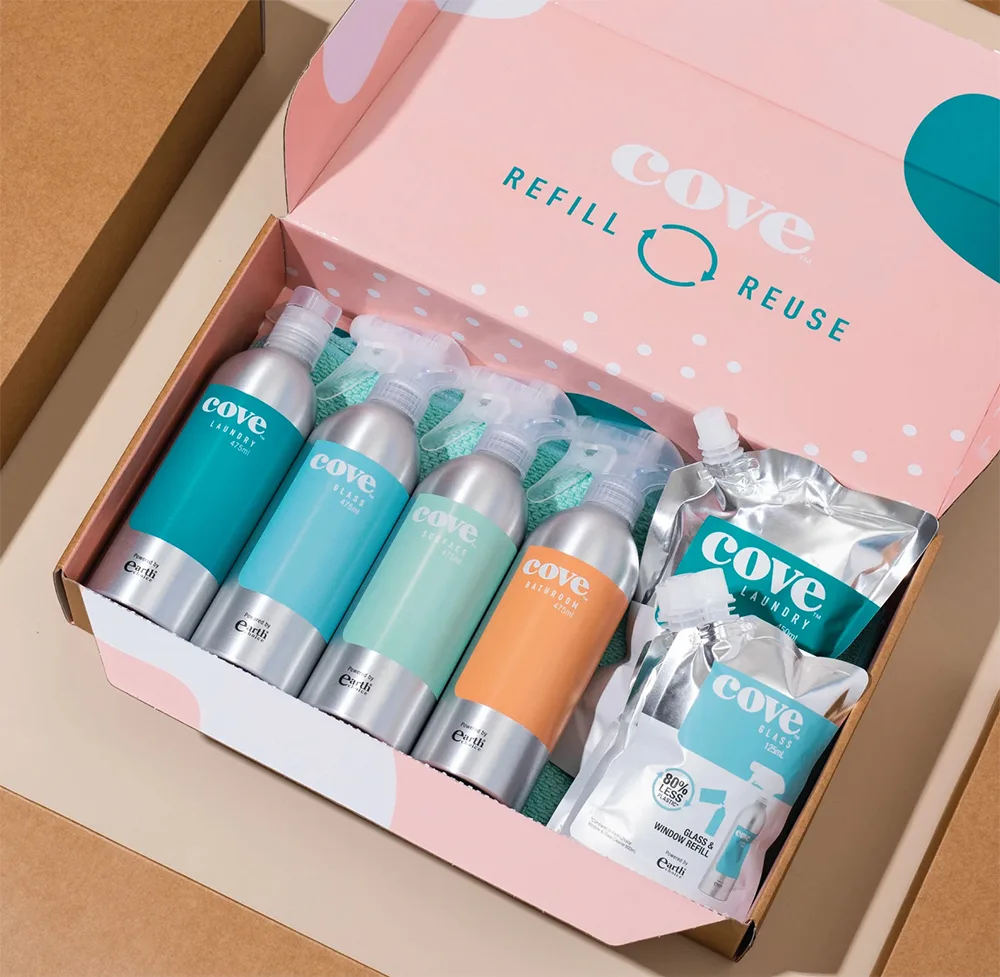
The Starter Kit (includes Laundry Liquid, All Purpose Surface Spray, Glass & Window Spray and Bathroom & Shower Spray), $69.95 (currently on sale for $55.95), from Cove Cleaning.
Vanish
Vanish has pledged to tackle the textile waste issue by helping Australians extend the life of their clothing, saving it from landfill and ultimately contributing to a slower fashion life cycle.
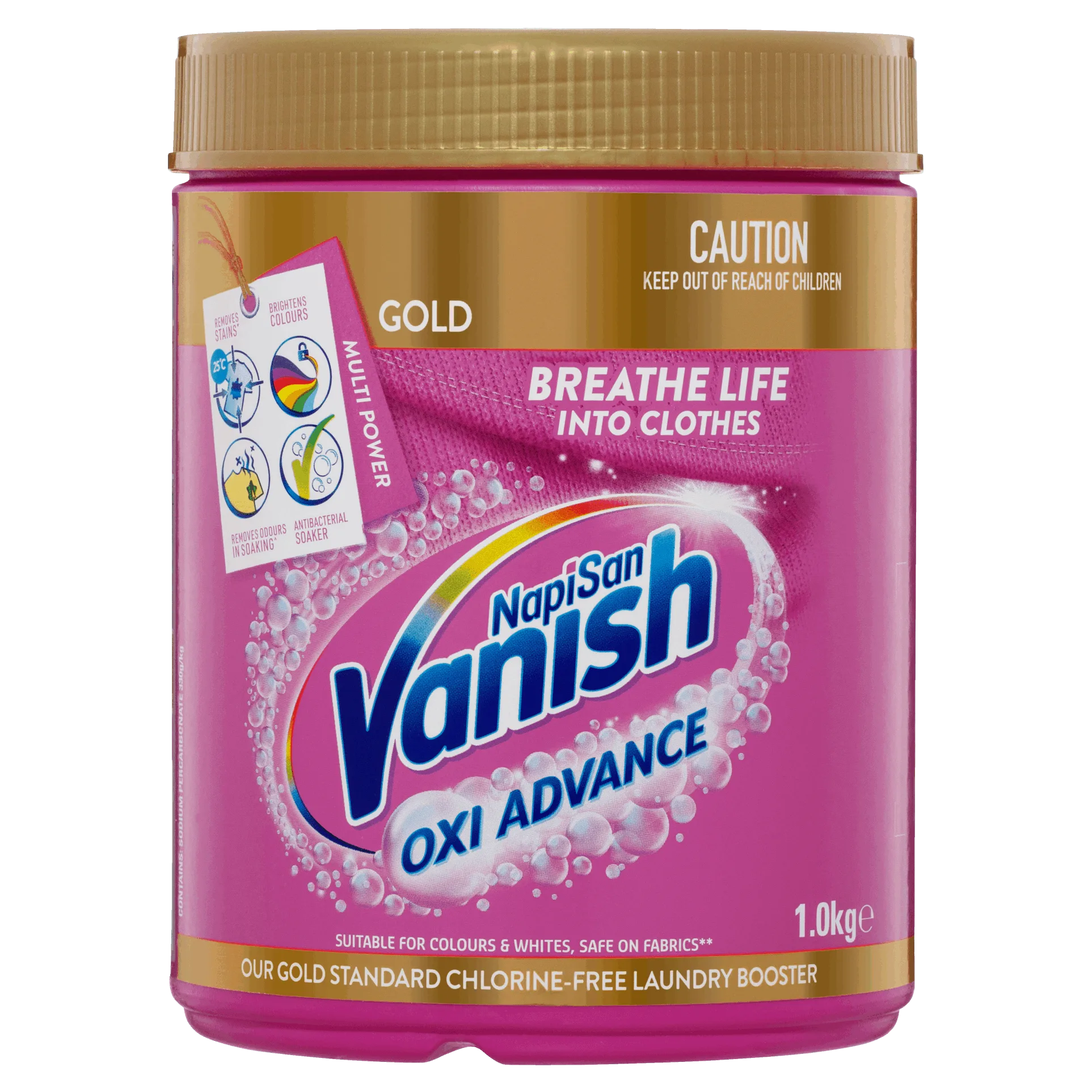
Vanish Oxi Advance, from Vanish
